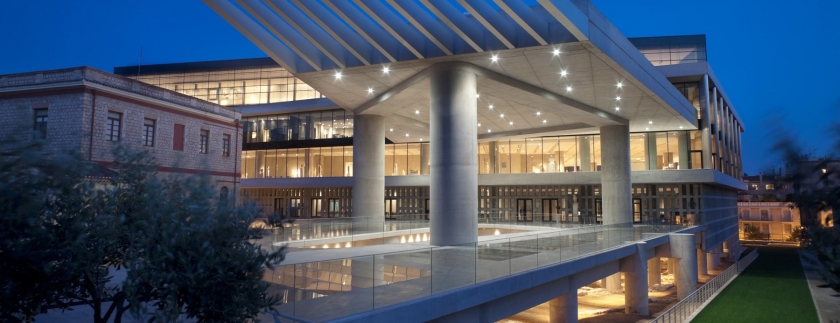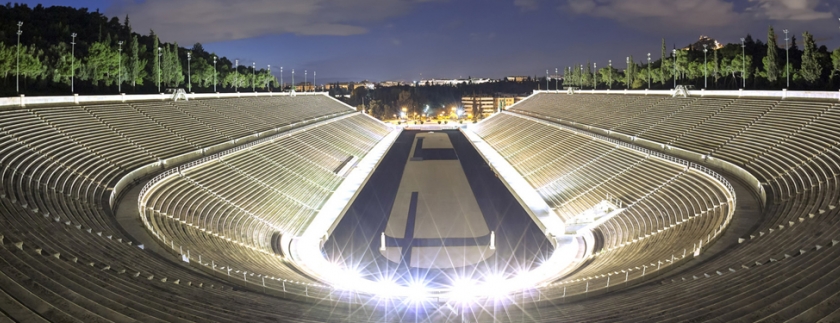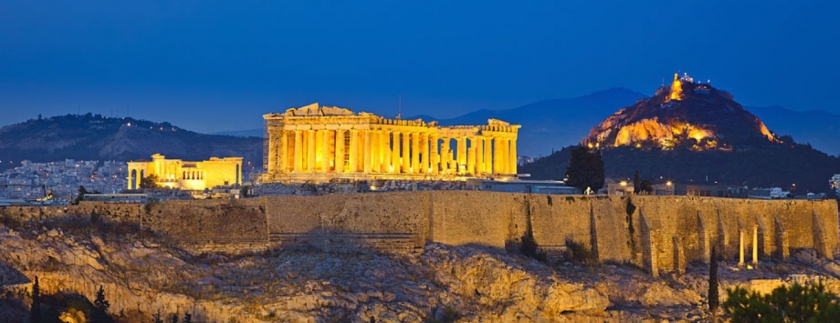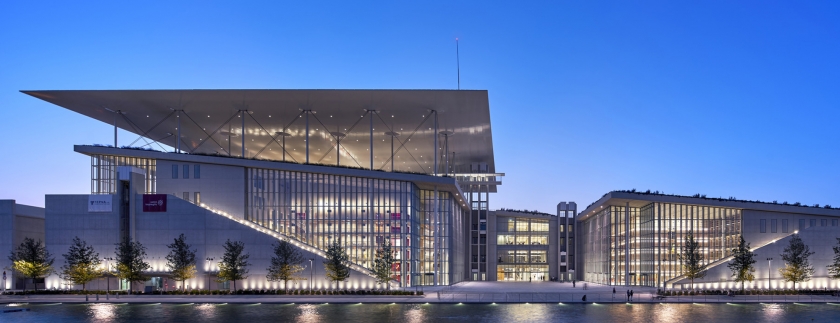The City of Athens
Athens, romanized: Athína is a coastal city in the Mediterranean and is both the capital and largest city of Greece. Athens is the historical capital of Europe; the birthplace of democracy, arts, science and philosophy of western civilisation and home of Plato, Socrates, Pericles, Euripides, Sophocles, Aeschylus. Athens is one of the world’s oldest cities with recorded history spanning around 3.400 years. Today, the contemporary urban scenery under the shadow of Parthenon reflects the exciting history of the city.
The perfect Mediterranean climate with the legendary greek sunlight, the unique combination of glorious history with modern, urban innovation, the coexistence of great culture with astonishing natural beauty, the high standard hotel accommodation, modern means of transportation such as the cutting edge modern metro, the vibrant rhythm of life, the wide choice of opportunities for shopping, dining and night life and of course the warmth of the Athenians people makes Athens the perfect destination all year round.
The History of Athens
The History of Athens is one of the longest of any city in Europe and in the world. Athens has been continuously inhabited for over 3,000 years, becoming the leading city of Ancient Greece in the first millennium BC; its cultural achievements during the 5th century BC laid the foundations of western civilization. Its infrastructure is exemplar to the ancient Greek infrastructure.
During the Middle Ages, the city experienced decline and then recovery under the Byzantine Empire, and was relatively prosperous during the Crusades, benefiting from Italian trade. After a long period of decline under the rule of the Ottoman Empire, Athens re-emerged in the 19th century as the capital of the independent Greek state.
Classical Athens was a powerful city-state. It was a centre for the arts, learning and philosophy, and the home of Plato's Academy and Aristotle's Lyceum. It is widely referred to as the cradle of Western civilization and the birthplace of democracy, largely because of its cultural and political influence on the European continent—particularly Ancient Rome. In modern times, Athens is a large cosmopolitan metropolis and central to economic, financial, industrial, maritime, political and cultural life in Greece. In 2021, Athens' urban area hosted more than three and a half million people, which is around 35% of the entire population of Greece.
The oldest known human presence in Athens is the Cave of Schist, which has been dated to between the 11th and 7th millennia BC.Athens has been continuously inhabited for at least 5,000 years (3000 BC). By 1400 BC, the settlement had become an important centre of the Mycenaean civilization, and the Acropolis was the site of a major Mycenaean fortress, whose remains can be recognised from sections of the characteristic Cyclopean walls.Unlike other Mycenaean centers, such as Mycenae and Pylos, it is not known whether Athens suffered destruction in about 1200 BC, an event often attributed to a Dorian invasion, and the Athenians always maintained that they were pure Ionians with no Dorian element. However, Athens, like many other Bronze Age settlements, went into economic decline for around 150 years afterwards.
Iron Age burials, in the Kerameikos and other locations, are often richly provided for and demonstrate that from 900 BC onwards Athens was one of the leading centres of trade and prosperity in the region. The leading position of Athens may well have resulted from its central location in the Greek world, its secure stronghold on the Acropolis and its access to the sea, which gave it a natural advantage over inland rivals such as Thebes and Sparta.
By the sixth century BC, widespread social unrest led to the reforms of Solon. These would pave the way for the eventual introduction of democracy by Cleisthenes in 508 BC. Athens had by this time become a significant naval power with a large fleet, and helped the rebellion of the Ionian cities against Persian rule. In the ensuing Greco-Persian Wars Athens, together with Sparta, led the coalition of Greek states that would eventually repel the Persians, defeating them decisively at Marathon in 490 BC, and crucially at Salamis in 480 BC. However, this did not prevent Athens from being captured and sacked twice by the Persians within one year, after a heroic but ultimately failed resistance at Thermopylae by Spartans and other Greeks led by King Leonidas, after both Boeotia and Attica fell to the Persians.
The decades that followed became known as the Golden Age of Athenian democracy, during which time Athens became the leading city of Ancient Greece, with its cultural achievements laying the foundations for Western civilization.[citation needed] The playwrights Aeschylus, Sophocles and Euripides flourished in Athens during this time, as did the historians Herodotus and Thucydides, the physician Hippocrates, and the philosopher Socrates. Guided by Pericles, who promoted the arts and fostered democracy, Athens embarked on an ambitious building program that saw the construction of the Acropolis of Athens (including the Parthenon), as well as empire-building via the Delian League. Originally intended as an association of Greek city-states to continue the fight against the Persians, the league soon turned into a vehicle for Athens's own imperial ambitions. The resulting tensions brought about the Peloponnesian War (431–404 BC), in which Athens was defeated by its rival Sparta.
By the mid-4th century BC, the northern Greek kingdom of Macedon was becoming dominant in Athenian affairs. In 338 BC the armies of Philip II defeated an alliance of some of the Greek city-states including Athens and Thebes at the Battle of Chaeronea, effectively ending Athenian independence. Later, under Rome, Athens was given the status of a free city because of its widely admired schools. In the second century AD, The Roman emperor Hadrian, himself an Athenian citizen, ordered the construction of a library, a gymnasium, an aqueduct which is still in use, several temples and sanctuaries, a bridge and financed the completion of the Temple of Olympian Zeus.
By the end of Late Antiquity, Athens had shrunk due to sacks by the Herulians, Visigoths, and Early Slavs which caused massive destruction in the city. In this era, the first Christian churches were built in Athens, and the Parthenon and other temples were converted into churches.[citation needed] Athens expanded its settlement in the second half of the Middle Byzantine Period, in the ninth to tenth centuries AD, and was relatively prosperous during the Crusades, benefiting from Italian trade. After the Fourth Crusade the Duchy of Athens was established. In 1458, it was conquered by the Ottoman Empire and entered a long period of decline.
Following the Greek War of Independence and the establishment of the Greek Kingdom, Athens was chosen as the capital of the newly independent Greek state in 1834, largely because of historical and sentimental reasons. At the time, after the extensive destruction it had suffered during the war of independence, it was reduced to a town of about 4,000 people (less than half its earlier population) in a loose swarm of houses along the foot of the Acropolis. The first King of Greece, Otto of Bavaria, commissioned the architects Stamatios Kleanthis and Eduard Schaubert to design a modern city plan fit for the capital of a state.
The first modern city plan consisted of a triangle defined by the Acropolis, the ancient cemetery of Kerameikos and the new palace of the Bavarian king (now housing the Greek Parliament), so as to highlight the continuity between modern and ancient Athens. Neoclassicism, the international style of this epoch, was the architectural style through which Bavarian, French and Greek architects such as Hansen, Klenze, Boulanger or Kaftantzoglou designed the first important public buildings of the new capital. In 1896, Athens hosted the first modern Olympic Games. During the 1920s a number of Greek refugees, expelled from Asia
Minor after the Greco-Turkish War and Greek genocide, swelled Athens's population; nevertheless it was most particularly following World War II, and from the 1950s and 1960s, that the population of the city exploded, and Athens experienced a gradual expansion.
In the 1980s it became evident that smog from factories and an ever-increasing fleet of automobiles, as well as a lack of adequate free space due to congestion, had evolved into the city's most important challenge. A series of anti-pollution measures taken by the city's authorities in the 1990s, combined with a substantial improvement of the city's infrastructure (including the Attiki Odos motorway, the expansion of the Athens Metro, and the new Athens International Airport), considerably alleviated pollution and transformed Athens into a much more functional city. In 2004, Athens hosted the 2004 Summer Olympics.
Relevant Links:



